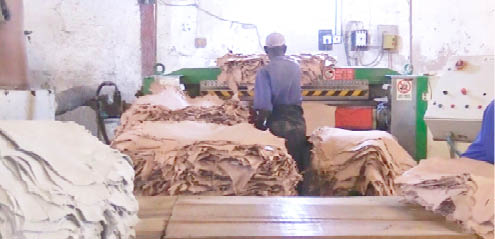Hides and skin business is an age-long industrial practice that made Nigeria one of the best leather producers in the world. But the current foreign exchange crisis, coupled with the economic turbulence and persistent farmers/herders conflicts have continued to threaten local tanneries in northern Nigeria, Daily Trust Saturday reports.
Daily Trust Saturday visited some of the manufacturing industries that managed to remain in business of leather tanning and processing in Kano amidst harsh economic environment.
It was gathered that over 700 factories and industries in Nigeria have either stopped production or completely shut down from May 2023 till date.
Alhaji Sale Hussain, a former chairman of the Manufacturers Association of Nigeria (MAN) in Kano, said unfavourable government policies and unstable power supply, as well as the difficulties in accessing foreign exchange, were some of the major concerns of industrialists across the country.
- My appointment recognition of women’s potentials – Kano LG caretaker chairperson
- We need teachers, learning materials, Kano communities beg SUBEB
“If you take a survey now around the factories, you will agree with me that even here, you can count between 300 and 400 industries that are not working; maybe you can only count 100 or 200 that are working at half capacity,” Hussain said.
A famous industrialist, Alhaji Ali Madugu, said the crisis within Nigeria’s industrial sector, more especially the current situation, had never happened.
He said many had thought the current administration would do something to restore the country’s industrial sector to the path of growth, but instead, they found themselves in another round of foreign exchange crisis.
“From the beginning of this administration, all the prices of our inputs started going up rapidly. You will have a change of price from our suppliers like three to four times in a month. Towards the end of the year, it became almost like a daily occurrence. And it became hourly – any hour you discuss with your supplier, he will tell you that if you didn’t strike a deal with him, the price would change. So, after one hour, I have to check my inputs,” he said.
Daily Trust Saturday reports that GB Tannery is among the few surviving indigenous hides and skin factories in Kano, where hundreds of youths work to earn a living. Unfortunately, Nigeria’s industrial sector is facing threats at the moment, and the executive director of GB Tannery, Alhaji Muaazam Tijjani Garo, also said it had never been this bad.
“Because of the rate of inflation in the country, members of staff keep asking for salary increment. Basically everything has increased. The effect of forex is not only on specific sectors in the economy, it affects everywhere, including factories,” Garo said.
He added that they normally sourced their raw materials from animals across farming communities in northern Nigeria, but the growing farmers/herders conflicts forced them to import from neighbouring countries, amidst the high cost of foreign exchange.
He said, “The issue of raw material is also another concern. You see, we are part of agriculture because our product is hides and skin, which herders produce from animals. But there is insecurity, so the supply is not as adequate as before – there are areas that are now inaccessible.”
Unlike tanneries, where finished products are exported, the leather processing industry depends largely on imported raw materials to produce sacks for local consumption.
B.B.Y Company in Kano told our correspondent that it had to cut down the production output if it must continue in business.
“Most companies in the manufacturing sectors cannot tell you that they are getting profits or running the business the way it is supposed to be, we are just running to survive. The situation is very difficult, and as a result, many companies have either shut down or scaled down production,” the company said.
Meanwhile, the chairman of the Manufacturers Association of Nigeria in Kano, Alhaji Muhammad Bello Isiyaku Tofa, said Nigerians would continue to pay the price of the current industrial crisis unless the problem of electricity is addressed, raw materials become adequate and security of lives and property guaranteed. He insisted that the future of Nigeria’s industrial sector may continue to remain bleak if the situation is not checked.
He said, “The government needs to do a lot and know that we are at a juncture where we need to decide whether we want to be a producing or consuming country. Are we going to carry on importing everything or we want to export?”
He added that several other factories were forced to shut down because they could not cope with the situation, and those who managed to remain afloat had to cut down production output and the number employees significantly.
Most of the industrialists believe it is only the government that can solve the problem of forex so that manufacturers can have a friendly environment to produce and export goods to other countries of the world.
Meanwhile, Nigerians are lamenting that they have continued to buy industrial finished products at higher costs and there’s absolutely no sign of relief despite pressure on the authorities to regulate ease of doing business.
Despite this disturbing situation, some experts still hope for change, but while they wait, economic hardship among ordinary Nigerians may continue to increase.

 Join Daily Trust WhatsApp Community For Quick Access To News and Happenings Around You.
Join Daily Trust WhatsApp Community For Quick Access To News and Happenings Around You.


